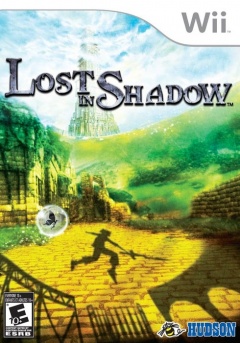limbo
Lost in Shadow
 Hudson Soft. Now there’s a name that you don’t see on game boxes much anymore. The company that used to pump out Bomberman and Mario Party titles wasn’t much of a player this generation, were they?
Hudson Soft. Now there’s a name that you don’t see on game boxes much anymore. The company that used to pump out Bomberman and Mario Party titles wasn’t much of a player this generation, were they?
And it seems we’ll never see the old honey bee logo on another boxart ever again: as of March 1 this year, Hudson Soft is officially dead. The last of its assets have been absorbed into Konami, which will probably put the Bomberman brand to good use and seal Hudson’s other, less milkable properties in the vault.
That makes Lost in Shadow Hudson’s swan song. The company developed and published the shadow-based puzzle platformer and released it in January 2011 in North America. Like most Hudson games, it found modest critical praise at launch and was quickly forgotten. With Hudson’s recent demise, I guess that makes this as good a time as any to try out the company’s last contribution to gaming.
Limbo
 Theologically, limbo exists as a state of divine neutrality, a residence
between heaven and hell. Limbo by Playdead Studios displays this fuzzy
pseudo-reality in its presentation, but with a sinister twist. This
limbo can be cruel, grewsome and even downright evil. Bear traps randomly lie on the
ground, forever waiting just for you alone to trigger them. Giant spiders
hide in caves, hoping you'll wander close enough for them to skewer with their giant
legs. In Limbo, ghost children satisfy their concept of play by setting
up guilottines and buzzsaws to shred you. This game is in no way particularly kind.
Theologically, limbo exists as a state of divine neutrality, a residence
between heaven and hell. Limbo by Playdead Studios displays this fuzzy
pseudo-reality in its presentation, but with a sinister twist. This
limbo can be cruel, grewsome and even downright evil. Bear traps randomly lie on the
ground, forever waiting just for you alone to trigger them. Giant spiders
hide in caves, hoping you'll wander close enough for them to skewer with their giant
legs. In Limbo, ghost children satisfy their concept of play by setting
up guilottines and buzzsaws to shred you. This game is in no way particularly kind.
However, that cruel nature only adds to the atmosphere as the player must remain constantly aware of the presense of death in this bizarre, mysterious minimalist world. In this world and state of existence, death is the norm. Beginning as a stylistic proof of concept by a disgruntled game artist named Arnt Jensen, the concept soon flourished into a full game as Jensen subsequently co-founded Playdead Studios with Dino Patti to develop his idea. Originally planned for a PC release, Playdead was able to procure Dutch government grants and investor support while eventually deciding on an Xbox Live Arcade release, likely to avoid piracy worries and possibly for 360 exclusivity bonuses provided by Microsoft. The game eventually released this summer on July 21st during the 360's "Summer of Arcade." So, how does the final product match atmosphere and action? Does the constant presence of death help or hurt player mood and motivation? Let's take a deeper look and try to decide.
